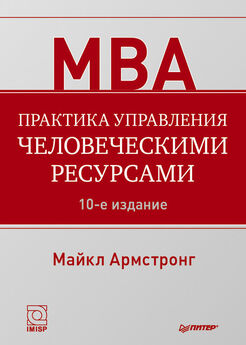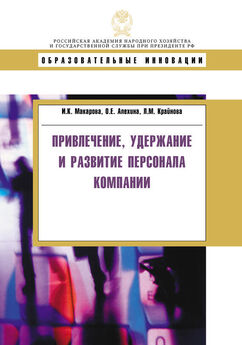Майкл Армстронг - Практика управления человеческими ресурсами

- Название:Практика управления человеческими ресурсами
- Автор:
- Жанр:
- Издательство:Питер
- Год:2012
- ISBN:978-5-459-0115
- Рейтинг:
- Избранное:Добавить в избранное
-
Ваша оценка:
Майкл Армстронг - Практика управления человеческими ресурсами краткое содержание
В книге всемирно известного ученого дан подробный обзор теоретических и практических основ управления человеческими ресурсами. В числе прочих рассмотрены такие вопросы, как процесс управления ЧР; работа и занятость; организационное поведение; обеспечение организации управления трудовыми ресурсами; управление показателями труда; вознаграждение.
В десятом издании материал многих глав переработан и дополнен. Это обусловлено значительным развитием УЧР: созданием теории и практики управления человеческим капиталом, повышенным вниманием к роли работников «передней линии», к вопросам разработки и внедрения стратегий УЧР, к обучению и развитию персонала. Все эти темы рассмотрены в новых или существенно переработанных главах. Также в книге приведено много реальных примеров из практики бизнеса.
Адресовано слушателям программ МВА, аспирантам, студентам старших курсов, обучающимся по управленческим специальностям, а также профессиональным менеджерам и специалистам по управлению человеческими ресурсами.
Перевод: И. Малков
Практика управления человеческими ресурсами - читать онлайн бесплатно ознакомительный отрывок
Шрифт:
Интервал:
Закладка:
79. Bessant J., Caffyn S., Gilbert J., Harding R. Rediscovering continuous improvement, Technovation, 14(3), pp. 17–29, 1994.
80. Bevan S., Barber L., Robinson D. Keeping the Best: A practical guide to retaining key employees, Institute for Employment Studies, Brighton, 1997.
81. Bevan S., Thompson M. Performance management at the cross roads, Personnel Management, November, pp. 36–39, 1991.
82. Bibbings R. Hearsay and heresy, The RoSPA Occupational Health and Safety Journal, July, pp. 51–52, 2003.
83. Billson I. How just-in-time training can support business-led competency development, Competency, Spring, pp. 21–24, 1998.
84. Birchall D., Lyons L. Creating Tomorrow’s Organisation, Pitman, London, 1995.
85. Blackburn R. M. and Mann R. The Working Class in the Labour Market, Macmillan, London, 1979.
86. Blackler F. Knowledge, knowledge work and experience Organization Studies, 16(6), pp. 16–36, 1995.
87. Blake P. The knowledge management explosion, Information Today, 15(1), pp. 12–13, 1988.
88. Blake R., Mouton J. The Managerial Grid, Gulf Publishing, Houston, 1964.
89. Blake R., Shepart H., Mouton J. Breakthrough in Organizational Development, Harvard Business Review, 42, pp. 237–58, 1964.
90. Blinkorn S., Johnson С. The insignificance of personality testing, Nature, 348, pp. 20–27, 1990.
91. Bloom M., Milkovich G. T. Rethinking international compensation, Compensation and Benefits Review, April, pp. 17–27, 1998.
92. Blyton P., Turnbull P. (eds) Reassessing Human Resource Management, Sage Publications, London, 1992.
93. Bontis N. There’s a price on your head: managing intellectual capital strategically, Business Quarterly, Summer, pp. 4–47, 1996.
94. Bontis N. Intellectual capital: an exploratory study that develops measures and models, Management Decision, 36(2), pp. 63–76, 1998.
95. Bontis N., Dragonetti N. C., Jacobsen К., Roos G. The knowledge toolbox: a review of the tools available to measure and manage intangible resources, European Management journal, 17(4), pp. 391–402, 1999.
96. Boudreau J. W. Utility analysis, in Human Resource Management: Evolving roles and responsibilities, ed. L Dyer, Bureau of National Affairs, Washington, DC, 1988.
97. Bower J. L. Business policy in the 1980s, Academy of Management Review, 7(4), pp. 630–38, 1988.
98. Bowey A. The Effects of Incentive Pay Systems, Department of Employment, Research Paper 36, DOE, London, 1982.
99. Bowles M. L., Coates G. Image and substance: the management of performance as rhetoric or reality?, Personnel Review, 22(2), pp. 3–21, 1993.
100. Boxall P. F. Strategic HRM: a beginning, a new theoretical direction, Human Resource Management Journal, 2(3), pp. 61–79, 1992.
101. Boxall P. F. The significance of human resource management: a reconsideration of the evidence, The International Journal of Human Resource Management, 4(3), pp. 645–65, 1993.
102. Boxall P. F. Placing HR strategy at the heart of the business, Personnel Management, July, pp. 32–35, 1994.
103. Boxall P. F. The strategic HRM debate and the resource-based view of the firm, Human Resource Management Journal, 6(3), pp. 59–75, 1996.
104. Boxall P. F. Human resource strategy and competitive advantage: a longitudinal study of engineering consultancies, Journal of Management Studies, 36(4), pp. 443–63, 1999.
105. Boxall P., Purcell J. Strategic Human Resource Management, Palgrave Macmillan, Basingstoke, 2003.
106. Boyatzis R. The Competent Manager, Wiley, New York, 1982.
107. Boyett J. H., Conn H. P. Maximum Performance Management, Glenbridge Publishing, Oxford, 1995.
108. Bradley P., Hendry С., Perkins P. Global or multi-local? The significance of international values in reward strategy, in International HRM: Contemporary issues in Europe, ed С Brewster and H Harris, Routledge, London, 1999.
109. Braverman H. Labour and Monopoly Capital, Monthly Review Press, New York, 1974.
110. Brayfield A. H., Crockett W. H. Employee attitudes and employee perfor mance, Psychological Bulletin, 52, pp. 346–424, 1955.
111. Brewster С. Developing a «European» model of human resource management, The International Journal of Human Resource Management, 4(4), pp. 765– 84, 1993.
112. Brewster С. Strategic Human Resource Management: the value of different paradigms, in Strategic Human Resource Management, ed R. S. Schuler and S. E. Jackson, Blackwell, Oxford, 1999.
113. Brewster С. European perspectives of human resource management, Human Resource Management Review, 14(4), pp. 365–82, 2004.
114. Brewster С., Holt Larsen H. Human resource management in Europe: evidence from ten countries, International Journal of Human Resource Management, 3(3), pp. 409–34, 1992.
115. Brewster С., Lloyd J. The changing face of union negotiations, Human Resources, Summer, pp. 148–52, 1994.
116. Brockbank W., Ulrich D., Beatty D. HR professional development: creating the future creators at the University of Michigan Business School, Human Resource Management, 38, Summer, pp. 111–17, 1999.
117. Brown D. Presentation to the Compensation Forum meeting, February, 1998.
118. Brown D. Reward Strategies, From Intent to Impact, CIPD, London, 2001.
119. Brown J. А. The Social Psychology of Industry, Penguin Books, Harmondsworth, 1954.
120. Brown D., Armstrong M. Terms of endearment, People Management, 11 September, pp. 36–38, 1997.
121. Brown D., Armstrong M. Paying for Contribution, Kogan Page, London, 1999.
122. Brumbach G. В. Some ideas, issues and predictions about performance management, Public Personnel Management, Winter, pp. 387–402, 1988.
123. Buchanan D. Job enrichment is dead: long live high performance work design!, Personnel Management, May, pp. 40–43, 1987.
124. BuchananD., Huczynski A. Organizational Behaviour, Prentice-Hall, Englewood Cliffs, NJ, 1985.
125. Bulla D. N., Scott P. M. Manpower requirements forecasting: a case example, in Human Resource Forecasting and Modelling, ed D. Ward T. P. Bechet and R. Tripp. The Human Resource Planning Society, New York, 1994.
126. Burdett J. О. What is empowerment anyway? Journal of European Industrial Training, 15(6), pp. 23–30, 1991.
127. Burgess S., Rees H. Job tenure in Britain, Economic Journal, March, pp. 334– 44, 1996.
128. Burgoyne J. Competency Approaches to Management Development, Centre for the Study of Management Learning, University of Lancaster, 1988a.
129. Burgoyne J. Management development for the individual and the organization, Personnel Management, June, pp. 40–44, 1988b.
130. Burgoyne J. As reported in Personnel Management Plus, May, p. 7, 1994.
131. Burgoyne J. Design of the times, People Management, 3 June, pp. 39–14, (1999).
132. Burner D. Managing Change: A Strategic Approach to Organizational Dynamics, 2nd edn, Pitman, London, 1996.
133. Burns J. M. Leadership, Harper & Row, New York, 1978.
134. Burns T., Stalker G. The Management of Innovation, Tavistock, London, 1961.
135. Burt С. The differentiation of intellectual ability, British Journal of Educational Psychology, 24, pp. 45–67, 1954.
136. Caldwell R. Champions, adapters, consultants and synergists: the new change agents in HRM, Human Resource Management Journal, 11(3), pp. 39–52, 2001.
137. Caldwell R. Rhetoric, facts and self-fulfilling prophesies: exploring practitioners’ perceptions of progress in implementing HRM, Industrial Relations Journal, 35(3), pp. 196–215, 2004.
138. Campbell J. P. Modelling the performance prediction problem in industrial and organizational psychology, in Handbook of Industrial and Organizational Psychology, ed M. P. Dunnette and L. M. Hugh, Blackwell, Cambridge, MA, 1990.
139. Cannon T. Knowledge entrepreneurs and the responsible corporation, in Human Capital and Corporate Regulation, ed Anthony Carey and Nigel Sleigh-Johnson, Institute of Chartered Accountants, London, 2000.
140. Cappelli P. Employment Practices and Business Strategy, Oxford University Press, New York, 1999.
141. Cappelli P. A market-driven approach to retaining talent, Harvard Business Review, January/February, pp. 103–11, 2000.
142. Cappelli P. Making the most of on-line recruiting, Harvard Business Review, 70(3), pp. 134–48, 2001.
143. Cappelli P., Crocker-Hefter A. Distinctive human resources are firms’ core competencies, Organizational Dynamics, Winter, pp. 7–22, 1996.
144. Cappelli P., Singh H. Integrating strategic human resources and strategic management, in Research Frontiers in Industrial Relations and Human Resources, ed D, 1992.
145. Lewin О. Mitchell and P Scheller, Industrial Relations Research Association, Madison, Win.
146. Carter A., Hirsh W., Aston J. Resourcing the Training and Development Function, Report No 390, Institute of Employment Studies, Brighton, 2002.
147. Casson J. Re-evaluating Company Manpower Planning in the Light of Some Practical Experiences, Institute of Manpower Studies, Brighton, 1978.
148. Cattell R. В. The Sixteen Personality Factor Questionnaire, Institute for Personality and Ability Training, Illinois, 1963.
149. Cave A. Organizational Change in the Workplace, Kogan Page, London, 1994.
150. Centre for Workforce Development. The Teaching Firm: Where productive work and learning converge, Newton, MA, 1998.
151. CFO Research Services Human Capital Management: The CFO’s perspective, CFO Publishing, Boston, MA, 2003.
152. Chadwick С., Cappelli P. Alternatives to generic strategy typologies in human resource management, in P. Wright L., Dyer J. Boudreau and G. Milkovich (eds) Research in Personnel and Human Resource Management, JAI Press, Greenwich, CT, 1998.
153. Chamberlain N. W., Kuhn J. Collective Bargaining, McGraw-Hill, New York, 1965.
154. Chartered Institute of Personnel and Development Labour Turnover Report, CIPD, London, 2000.
155. Chartered Institute of Personnel and Development Developing Managers for Business Performance, CIPD, London, 2002.
156. Chartered Institute of Personnel and Development Code of Conduct for Equal Opportunities, CIPD, London, 2002.
157. Chartered Institute of Personnel and Development (2003a) Employee Absence, CIPD, London.
158. Chartered Institute of Personnel and Development Human Capital: External reporting framework, CIPD, London, 2003b.
159. Chartered Institute of Personnel and Development Reward Management 2003: A Survey of Polio/ and Practice, CIPD, London, 2003c.
160. Chartered Institute of Personnel and Development How to Develop a Reward Strategy, CIPD, London, 2004a.
161. Chartered Institute of Personnel and Development Human Capital Reporting: An internal perspective, CIPD, London, 2004b.
162. Chartered Institute of Personnel and Development Professional Standards, CIPD, London, 2004c.
163. Chartered Institute of Personnel and Development Survey of Recruitment, Retention and Turnover, CIPD, London, 2004d.
164. Chartered Institute of Personnel and Development How to Develop a Reward Strategy, CIPD, London, 2004e.
165. Chartered Institute of Personnel and Development Bullying at Work: Beyond policies to a culture of respect, CIPD, London, 2005a.
166. Chartered Institute of Personnel and Development Managing Diversity, CIPD, London, 2005b.
167. Chartered Institute of Personnel and Development Recruitment, Retention and Turnover Survey, CIPD, London, 2005c.
168. Chartered Institute of Personnel and Development Reward Survey, CIPD, London, 2005d.
169. Chartered Institute of Personnel and Development Training and Development Survey, CIPD, London, 2005e.
Шрифт:
Интервал:
Закладка:










